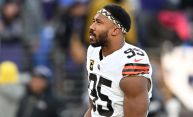An agreement was agreed between the NHL and the players' association Friday on issues regarding drug testing and player safety. However, the most critical thing at the moment - the economic divide between them - was not discussed.
After more than two weeks it seems some progress has been made when the sides returned to the bargaining table. The discussions lasted a good two hours in a morning session.
These were the first round of talks since the lockout on 16 September when the remaining preseason games were cancelled by the league.
The Associated Press reported former player Mathieu Schneider as saying: "You would absolutely hope that things progress and kind of catch fire, but right now we're just going to take it one step at a time and try to come to an agreement on as many issues as possible. We're taking baby steps right now."
Gary Bettman, the NHL Commissioner was present at the meeting Friday. There are two more meetings scheduled on the weekend.
Schneider said: "It says that both sides are committed to getting back to the table and working."
Neither side considered using performance enhancing drugs as an issue in the NHL.
"We're in agreement that it's not an issue in our sport," Schneider said. "I think it's in the players' best interest as well as the sport to close off any possible time during the year where players could use.
"We like to say that nothing is agreed to until everything is agreed to, but we've certainly made some headway. A lot of it was done previous to this morning. We're taking notes of where we stand. I would say that we have a lot of mutual ground that we have found agreement on."
He ruled out any possibility of any monetary talks in the upcoming discussions as both sides it seems are still indecisive about how to split the $3 billion revenue generated annually.
"In general, when you're dealing with collective bargaining, when you start to have agreements on smaller issues, it can lead to bigger issues. But it's still too early to say," Schneider added.
Meanwhile Bill Daly, the NHL Deputy Commissioner said: "The calendar continues to tick along. My guess is as time goes on, regular-season games are at risk. I don't think it can be any more urgent than where we are now.
"We've had that level of urgency for a long time. In some respects you can meet all you want, but if there is no compromise or no movement or no new proposals I am not sure at the end of the day what you're meeting over.
"There is a very high degree of urgency certainly on our side. I can't speak for their side, but I am sure they would tell you there is a degree of urgency there, too."
© Copyright 2025 Sports World News, All rights reserved. Do not reproduce without permission.










